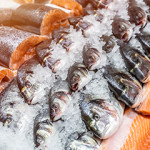Gift season drives sea cucumber sales
Sea cucumber season has truly kicked off in China judging by promotional activity in one of the country’s key aquaculture hubs. Ubiquitous advertising, highway billboards and retail displays in the southeast coastal city of Yantai suggest sea cucumbers are a priority commodity among producers and buyers.
Retailers visited by SeafoodSource reported brisk sales, particularly for the gift trade. Dried cucumber costs between RMB 320 and RMB 590 per 500-gram packs in Yantai Weihai Shen Shui Chan shop near the beach in downtown Yantai.
“People eat them for the Vitamin B and C,” explained shopkeeper Wang Bo. She pointed to lower prices for refrigerated, vacuum-packed sea cucumbers that retail at RMB 250 for 500 grams. “They’re cheaper because there’s more water in them,” she explained.
Much of the demand is driven by the gift trade. One of Bo’s customers, Lin Xiaojian, founder-owner of a welding company, explained he was buying two RMB 590 1-kilogram portions.
“People are spending a lot more on health these days,” explained Lin, before adding that the sea cucumbers were in fact gifts for local officials he’s hoping will give contracts to his firm. “I used to buy expensive rice wine but these days the fashion is for sea cucumbers … few ordinary people buy them to eat, it’s for gifting to government and army officials to keep good relations with them.”
Sales are strong given autumn is peak season for real-estate sales in China, where officials have come to expect gifts in return for approving various building certificates. The approach of the week-long National Day holiday, commencing 1 October, is also helping sales at shops like Bo’s. The holiday, intended to celebrate the founding of the socialist People’s Republic, has become a time for entertainment and travel.
Average wholesale sea cucumber prices rose to RMB 160 per kilo at the end of August, according to analysts. Those prices will climb through fall, predicted Sun Xia, an analyst at Sealand Securities.
“Autumn and winter are the traditional seasons for eating sea cucumber, so consumption will rise," said Sun. "But also supply will decrease sharply because growers have still not figured out how to cultivate sea cucumbers in the warmer southern regions of China.”
Others point to a stronger market share for firms with better marketing abilities. Wang Ping, an analyst at Great Wall Securities, sees a trend to stratification: “Demand for branded sea cucumbers has been strong, and that’s driven the prices up for those firms.”
Chinese aquaculture firms like Dalian-based Homey Group have invested extensively in seafood cultivation. In Yantai, meanwhile, the buying boom looks set to last up to the National Day holiday. Those with less cash meanwhile can see what all the fuss is about at local restaurants by eating sea cucumbers fresh. Prices at the Yantai Naval Academy Restaurant range between RMB 38 and RMB 58 each.






Share